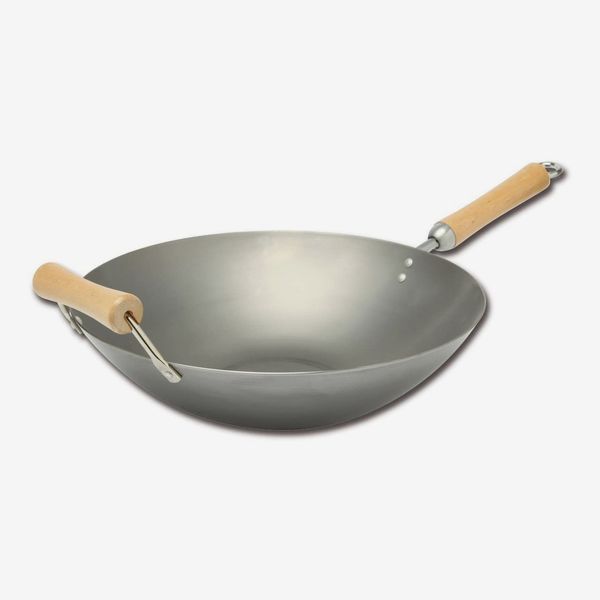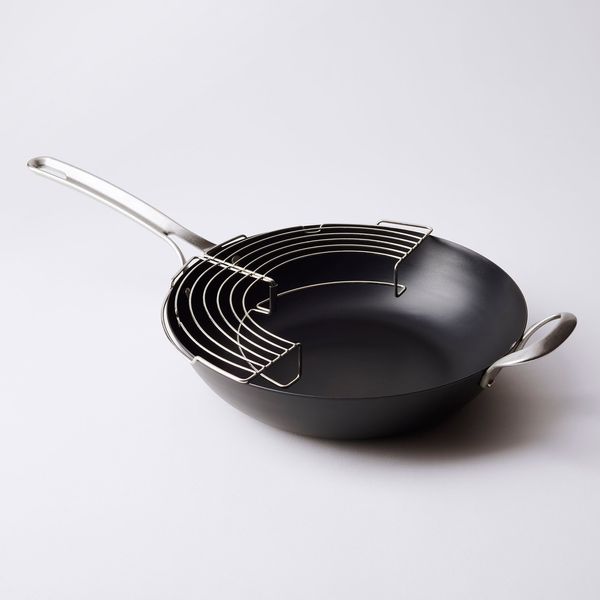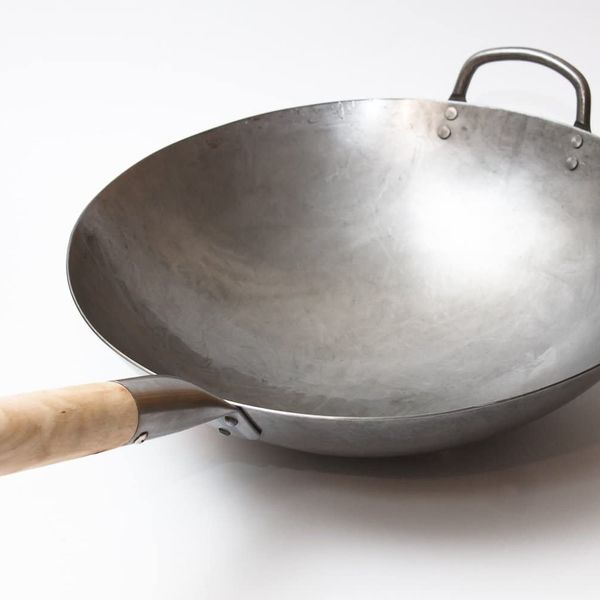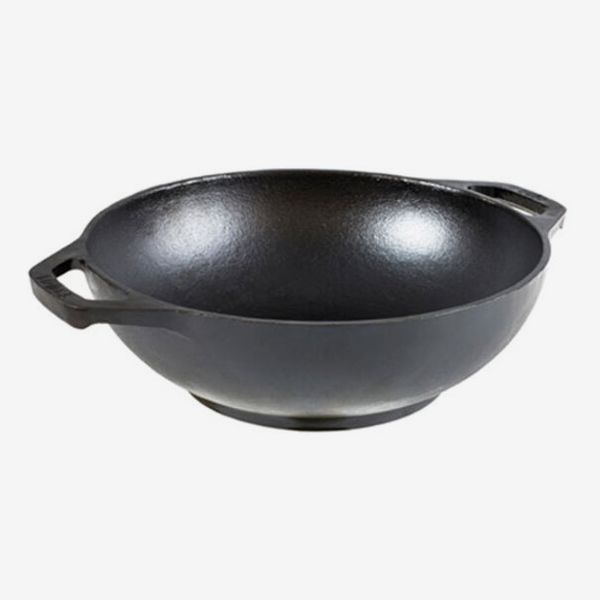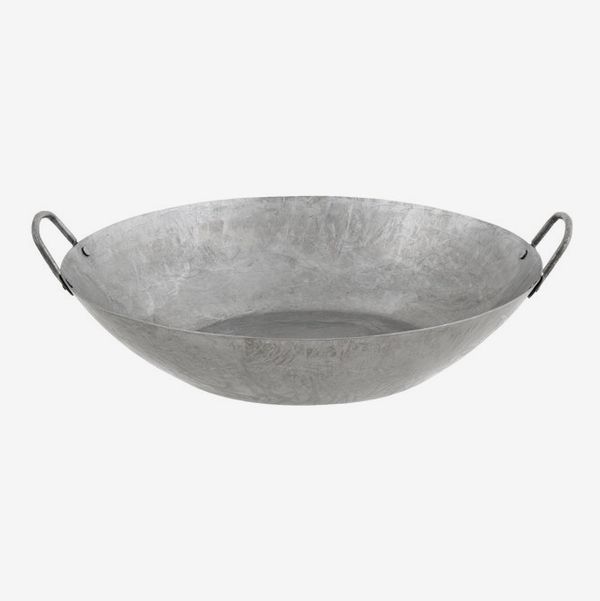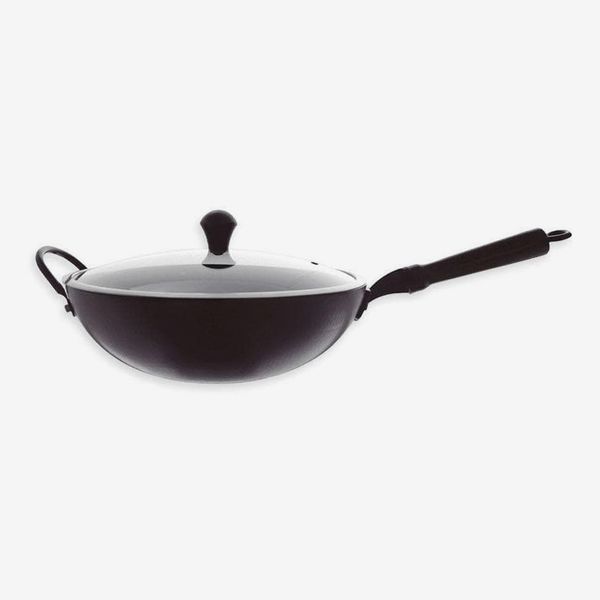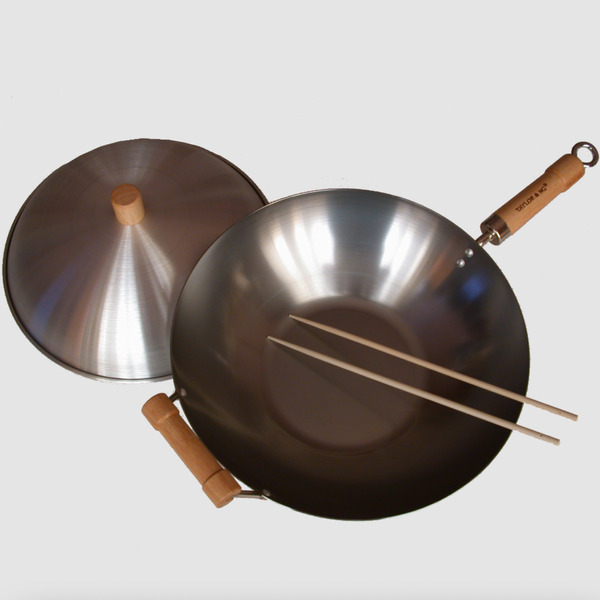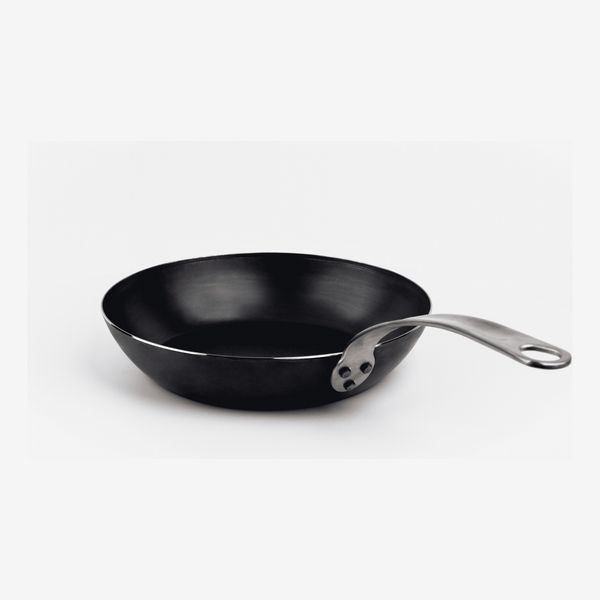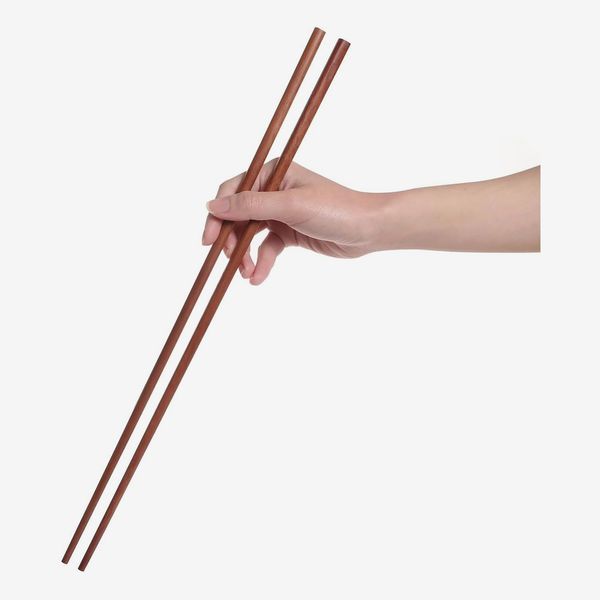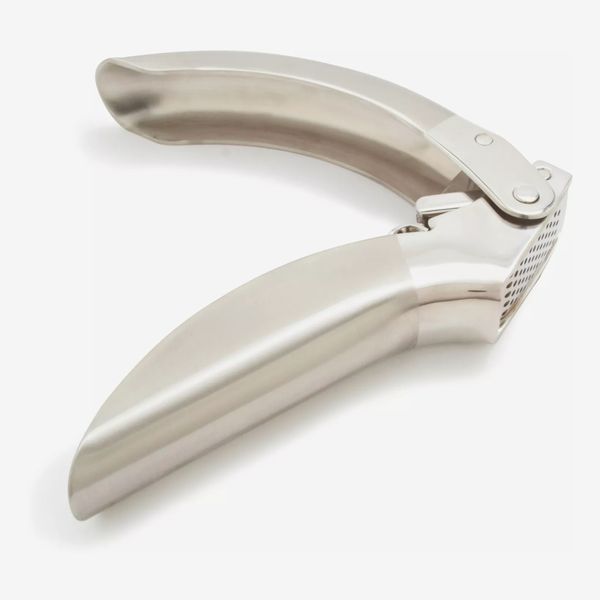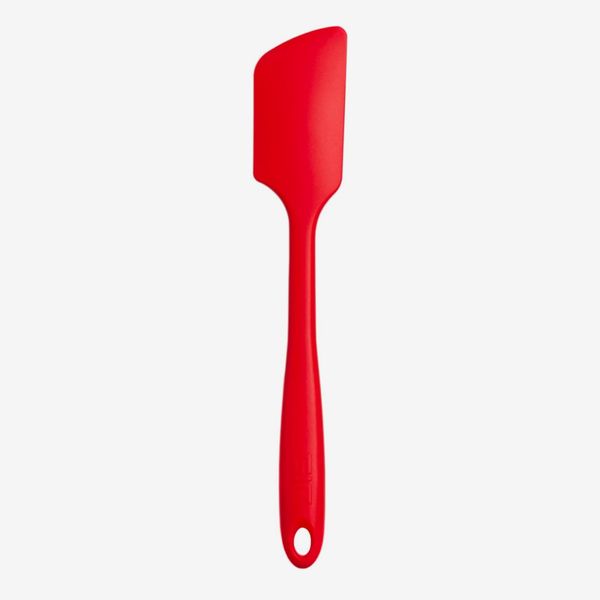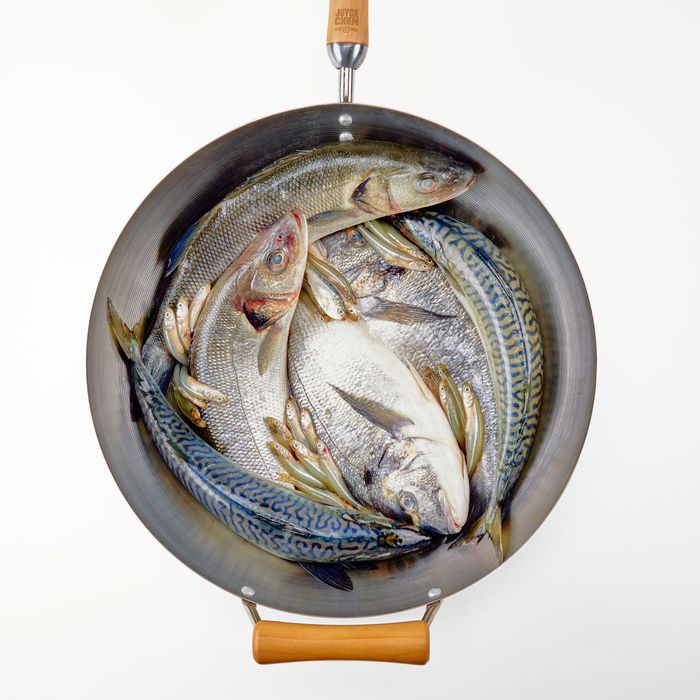
In this article
For a while, I was hesitant to add a wok to my kitchen solely because they’re rather large and I don’t have a ton of space. But since I’ve been using one — our best overall pick — for the past many months, it’s become an integral part of my cookware collection. Woks can be used to steam fish, make fried rice and noodle dishes, boil stew, and even pop popcorn for movie night — but there’s a reason you see them employed most often for stir-fries. J. Kenji López-Alt, whose latest book is dedicated to cooking with woks, explains that while Western skillets are more concerned with heat retention, woks are built to dial in on heat reactivity. This means they get hot really fast and stay that way if you want them to — but also cool down quickly, as needed. What’s more, the bottom is hotter than the sides because of the “V” shape, further assisting each component of a given dish to get to the temperature it should be. Dishes that benefit from a fast and hot contact with a pan — especially ones where you’re adding meat and vegetables with different cooking times one after the other — turn out so much better in a wok. From there, it’s a matter of practice. I take advice from Brandon Jew, owner of Mister Jiu’s in San Francisco, and make sure all my ingredients are portioned out and ready to go. “The process goes fast,” he says. I also make sure not to overcrowd, per Calvin Eng, owner of Bonnie’s in Brooklyn. Every time you add in an ingredient, it brings down the overall temperature, and “the high heat is crucial,” he told me.
This guidance is true across the board, and which wok you buy really comes down to preference about some of the smaller details. All the woks on this list should last a very long time thanks to the ultradurable material they’re made from (which I outline in more detail right below). Beyond that, López-Alt, Jew, Eng, and other chefs and cookware experts I spoke to simply say you have to think about what shape of bottom, handles, and handle material you prefer. Read on for their recommendations and my observations from testing a few woks, too. And if you’re interested in expanding the rest of your cookware collection, I have you covered — or read through our dedicated pieces to skillets, saucepans, and Dutch ovens.
Update on October 10, 2024: Added testing notes for the Made In Carbon-Steel Frying Pan; updated prices and checked stock for all products.
What we’re looking for
Material
Woks come in carbon-steel, cast-iron, anodized aluminum, stainless steel, nonstick, and enamel-lined cast-iron. Most experts prefer carbon-steel because, as “stir-fry guru” and cookbook author Grace Young explains, it “impeccably sears ingredients and gives stir-fries the elusive, smoky essence prized by Chinese gourmands.” She’s not the only one with a preference for that particular material, which is why nearly every wok I included on this list is made of carbon-steel. López-Alt notes that “it is strong, but not brittle.” This is “unlike cast-iron, which will crack if you make it thin enough to be lightweight.” Eventually, the surface of carbon-steel will develop a nonstick patina.
Shape
Woks are traditionally round-bottomed, meant to be placed on burners that specifically hold that shape (you’ll often see full ranges like this in Chinese restaurants). But many have flat bottoms designed to work on standard home burners, whether gas, induction, or coil. “Home stoves vary in heat and BTUs,” says Sohui Kim, owner and chef of Insa in Brooklyn. “But the great thing about a flat bottom is that you can get a ripping-hot heat. It mimics restaurant-quality technique.” You can, in fact, convert a regular burner with a wok ring if you prefer that style (or do like López-Alt and buy an outdoor setup for round-bottom wok use).
Handle
When it comes to handle shape, Mandarin-style woks (the majority of woks on this list) have an extended handle on one side, similar to the skillets you’re likely familiar with. This is helpful for maneuvering the wok around a burner and tossing ingredients with ease. Cantonese-style woks have two smaller handles on each side, good for fully picking the vessel up off the stove. Handle material is also a matter of preference. There’s the aesthetic of metal versus wood, plus you have to take into consideration that metal tends to get hotter than wood, but is also a more durable material in the long run.
Best wok overall
Material: Carbon steel | Shape: Flat bottom | Handle: Mandarin style with wood handles
Over the several months that I’ve been testing my Joyce Chen, I’ve been impressed by its sturdiness and how it handles heat. It sits on my stove and never tilts over, and the carbon steel is sensitive so it heats up with the flame but cools down when new ingredients are added to the mix. When I want to get a golden sear on chicken, not burn the vegetables and aromatics that go in after, and reduce the sauce, I can do so, all without adjusting the heat. (By contrast, this isn’t possible in my heavier cast-iron, which takes a while to get hot and then stays so hot the different components end up unevenly cooked, even if I do turn the burner up and down as I go.) I also like that it isn’t too heavy. It has comfortable handles that stay cool enough to grip well so I can maneuver all the pieces around easily. By contrast, “the loops on metal woks get super hot, and you need pot holders to handle,” says food writer and editor Matt Rodbard.
Joyce Chen is one of the most widely known (and trusted) names in the category, and it’s no surprise: Taylor Erkkinen, co-owner of The Brooklyn Kitchen cooking school, told me that the brand was the first to introduce flat-bottomed woks to American households. Kim has had hers — a fairly standard 14-inch size that comfortably feeds two to four people — for over two decades and doesn’t see herself having to ever replace it. “It can handle a ton of vegetables,” she says. “I especially like it for greens that start so giant in volume. You can add everything in and then move them around easily as they shrink.” She also notes that the ring at the top of the handle allows it to hang nicely in her kitchen.
Best wok with steel handles
Material: Carbon-steel | Shape: Flat bottom | Handle: Mandarin-style with metal handles
While it would take a lot of firepower to burn the wood handles of your wok, it is a more sensitive material than metal. (What’s more, if you have a wood-handled version that needs to be seasoned or reseasoned — which works in much the same way as seasoning your cast-iron in the oven — it’s recommended that you wrap wood handles in a damp cloth and cover them with tinfoil.)
Josh Grinker, co-owner of Brooklyn’s Kings Co Imperial, says the metal handles of this wok hold up — and are a breeze to clean. It also has a feature unlike any of the others: a removable steel grate in the shape of a rainbow that fits along one half of the edge. It’s a handy resting place for keeping food warm as you cook different components of a dish — say, making eggs for fried rice and then building the fried rice right underneath — or for draining oil if you’re frying foods like tempura.
Best round-bottomed wok
Material: Carbon steel | Shape: Round bottom | Handle: Mandarin style with one wood handle, one metal handle
Traditional woks have round bottoms, which allow them to reach intense temperatures over burners that shoot the flames straight up rather than in a circular pattern. If you can use one at home (you’d need a wok ring to replace the grate and metal disc of a gas burner, for example), Amelia Kang, co-owner of and chef at New York City’s MáLà Project, recommends the Pow Wok, made from conductive carbon-steel. “It’s suitable for quick, high-temperature stir-fried dishes,” she says. But be careful, as “it’s especially easy to burn the dishes if you are not fast enough.” While honing speed takes some practice, Munzerin Uddin and Harvey Wong, co-owners of Brooklyn’s The Monkey King, say putting in the effort is worth it so that you end up with perfectly cooked components every time. They’ve used this wok at their restaurant and in their home for several years and say the round bottom ensures food moves around easily and never gets trapped in the edges. Wong says he also likes the short wooden handle, which doesn’t get too hot and provides good control (the closer you can grip to the bowl, the sturdier your flips will be).
Best Cantonese-style wok
Material: Cast iron | Shape: Flat bottom | Handle: Cantonese style with cast-iron handles
This Cantonese wok — which has two smaller loop handles on both sides, rather than one long handle — is made from cast iron, giving it a weight that’s not so easy to maneuver around the stove. But “nothing retains heat like cast-iron,” says Jew. And unlike with stir-fries, this is an important attribute when it comes to fried rice, the success of which depends on the grains staying hot throughout the whole cooking process. “With a home stove, you’re simply not going to get to that same level you do in a restaurant,” he says, so you might as well set yourself up the best you can.
Best less-expensive Cantonese-style wok
Material: Carbon steel | Shape: Flat bottom | Handle: Cantonese style with metal handles
If you don’t want to invest quite so much but are intrigued by the idea of a Cantonese-style wok, this hand-hammered one from Webstaurant (one of our favorite online retailers that sells as many commercial kitchen goods as your local restaurant-supply store) fits the bill. Many of our experts mentioned that such shops are the perfect places to snag an inexpensive wok (as with sheet pans, there are a lot of great options out there, but you won’t be worse off for going with an affordable and practical option). It’s hand-hammered from carbon steel, like the round-bottomed model above, which means it’s also lighter than Jew’s recommendation.
Best wok with a lid
Material: Carbon steel | Shape: Flat bottom | Handle: Mandarin style with wooden handle
While a lot of recipes you make in a wok require pretty constant flipping and stirring, a lid that fits snugly over the opening will allow you to expand the number of dishes you can make in it. Chef and writer Lauren Joseph reaches for this Jia, Inc., wok any time she wants a pan with a wide surface area and high sides — but she particularly appreciates the lid, which she says is handy for braising a load of greens, steaming dumplings and cabbage rolls, and simmering fish curry. And while most options on this list allow you to buy a lid separately (and the less expensive one below comes with the full package, too), what makes the Jia, Inc., lid especially appealing is its transparency, so you can see what’s going on inside without releasing any steam or heat.
Best less expensive wok with a lid
Material: Carbon steel | Shape: Flat bottom | Handle: Mandarin style with wooden handle
For a more affordable set with a lid, consider this one from Taylor & Ng. When recipe developer and cookbook author Hannah Che was shopping for a new wok about five years ago, she knew she wanted one with a lid because it makes the pan much more versatile than it would be otherwise. Like Joseph, she uses it to simmer liquids and steam (for the latter task, she notes the lid helps the water boil faster before you put your food in). But she also finds it useful when making stir-fries. In the first steps, you’re releasing moisture from the aromatics and vegetables, but right at the end, she always introduces some liquid for added tenderness and flavor. “That’s when the lid goes on for 30 seconds to a minute,” she says. The brand also makes an even less expensive set without the steamer grate and spatula.
Best woklike frying pan
Material: Carbon steel | Shape: Flat bottom | Handle: Mandarin style with metal handle
This model from Made In is a hybrid between a flat-bottom wok and a frying pan — meaning overall, the shape is more in line with a standard skillet than that of others on this list. For a wok novice like me, the wider bottom is extra-efficient at distributing optimal high heat and moisture evaporation for that quick-cook effect without so much dramatic flipping, tossing, and turning.
But pros like it, too: Eric Sze, chef at 886 and Wenwen, says the shape is especially helpful with the reduced BTU of home stoves, and that when he does need to maneuver it around, the handle is “slightly curved” and “comfortable to hold,” whether close to his body for tossing or further out when it gets hot. Chef Lucas Sin notes that though the sides aren’t quite as sloped and high as a traditional wok, they’re high enough that he can still use the pan for braising, steaming, and boiling. And I find they’re high enough that when I do need to move ingredients around with a utensil, they don’t spill over.
Some useful tools for stir-frying
Our experts
• Hannah Che, recipe developer and cookbook author
• Calvin Eng, owner of Bonnie’s
• Taylor Erkkinen, co-owner of The Brooklyn Kitchen
• Josh Grinker, co-owner of Kings Co Imperial
• Brandon Jew, chef at Mister Jiu’s
• Lauren Joseph, chef and writer
• Amelia Kang, co-owner of and chef at MáLà Project
• Sohui Kim, owner of and chef at Insa
• J. Kenji López-Alt, chef and writer
• Matt Rodbard, food writer and editor
• Lucas Sin, chef
• Eric Sze, chef at 886 and Wenwen
• Munzerin Uddin, co-owner of the Monkey King
• Harvey Wong, co-owner of the Monkey King
• Grace Young, cookbook author and “stir-fry guru”
The Strategist is designed to surface the most useful, expert recommendations for things to buy across the vast e-commerce landscape. Some of our latest conquests include the best acne treatments, rolling luggage, pillows for side sleepers, natural anxiety remedies, and bath towels. We update links when possible, but note that deals can expire and all prices are subject to change.

